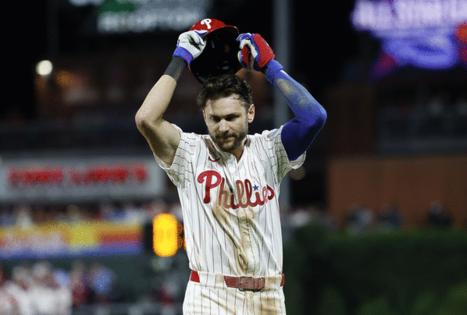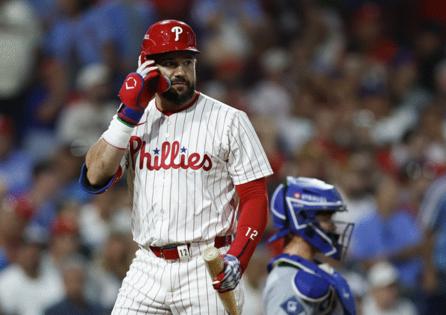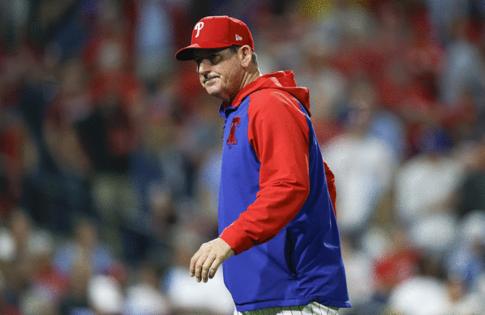David Murphy: Rob Thomson's bunt call, Dave Dombrowski's NLDS roster killed Phillies in Game 2
Published in Baseball
PHILADELPHIA — Rob Thomson said he was playing for the tie, which means the process was as flawed as the result.
The Phillies lost Game 2 of the NLDS because they did not try to win it.
It’s as simple as that. You do not negotiate with the jaws of defeat. You snatch the victory or you die trying.
Here lie the Phillies, 4-3 losers of Game 2 of the NLDS. Gone, but not undeserving.
Bryson Stott did his job. Nick Castellanos tried his best to do his. Any time that happens and things still go sideways, the issue is higher up on the food chain. In this case, the two men responsible were Thomson and his boss, Dave Dombrowski.
Thomson, for playing not to lose.
Dombrowski, for not giving Thomson the bench that might have saved him from his decision.
A refresher on the specifics:
The Phillies entered the ninth inning down 4-1, coming off an eighth inning in which they’d scored their first run since the second inning of Game 1. The fans had booed when Jhoan Duran’s entrance music played as he took the mound in the ninth. But, then, in the bottom of the frame, the ol’ Red October magic started to happen.
Alec Bohm singled. J.T. Realmuto doubled. Castellanos drove them both home with a blooper he narrowly stretched into a double. Suddenly, the tying run was 180 feet from home. The Phillies still hadn’t recorded their first out.
“I liked where our bullpen was at based on, as compared to theirs,” Thomson said. “We play for the tie at home.”
That was a mistake.
The Phillies had lost Game 1 of a five-game series. They’d used their three best relievers. They had an opposing bullpen and its manager on the ropes. They’d just gone 14 straight innings without scoring a run.
You can’t win a short series by playing not to lose. You can’t beat one of the best teams ever assembled by hoping to outlast them. You don’t play for a tie in a situation like that. You try to take full advantage of the opportunity the baseball Gods have granted you. You do not spite them by calling for a bunt.
That’s what Thomson did.
There are a lot of equally wise baseball men who would agree with him. He had Stott at the plate in a lefty-on-lefty matchup. He effectively had one bench player left, with the injured Harrison Bader as pinch-hitter and Weston Wilson reserved as his pinch-runner. After that, Thomson would need to let another lefty (Max Kepler) hit against Alex Vesia. Trea Turner would likely then get matched up against a tough righty closer in Roki Sasaki.
There are certain teams, with certain rosters, in certain series, where the situation would justify giving up the first out of an inning to sacrifice the tying run from second base to third.
The Phillies were not that team. They didn’t have that roster. The tying run was the lead-footed Castellanos. The only options to run for him were backup catcher Rafael Marchán or one of the pitchers.
Stott laid down a good bunt. The Dodgers disguised the wheel play they had called.
“They ran it as perfect as you can,” Stott said.
A better baserunner might have had a chance at avoiding the out at third. Castellanos didn’t.
This is where Dombrowski’s culpability lies. On a night where they didn’t have the one bench player they needed, they were carrying six starting pitchers for a series in which they only needed three. Even if it made sense to start Aaron Nola in Game 3 and keep Ranger Suárez in a special deployment role, that still would leave Walker Buehler and Taijuan Walker without obvious roles. Along with those two, lefty Tim Mayza seemed unlikely to pitch in anything other than a worst-case scenario.
“It is what it is,” Thomson said. “Couldn’t do much about it. I thought Stotty laid down a good bunt. But it’s the way it is. We knew that we were going to probably pinch-hit with Bader. We needed to have [Wilson] there. Plus, if you pinch run [Wilson] for Castellanos and then Bader hits, you have no one to run for him and you don’t have another outfielder. Kind of hands were tied.”
Dombrowski, who wasn’t available to comment after Game 2, would likely argue that the Phillies could just as easily have encountered a situation where we would have been second-guessing a lack of pitchers. If the Phillies had tied Game 2, and the game had gone extras, Buehler and Walker likely would have come in handy. The Phillies would have had the bench they needed if Bader hadn’t injured his groin in Game 1.
In the end, it is a results-based business.
From a personal standpoint, the first two games of this series have gone about as poorly as Thomson and Dombrowski could have feared. Thomson has been unable to make his bullpen better than the sum of Dombrowski’s parts. They flunked the ninth inning in Game 2. The decision to go with Nola over Suárez in Game 3 will be another defining call.
There will be a lot to unpack once the season is over. It sure looks like it will be soon.
©2025 The Philadelphia Inquirer, LLC. Visit at inquirer.com. Distributed by Tribune Content Agency, LLC.












Comments